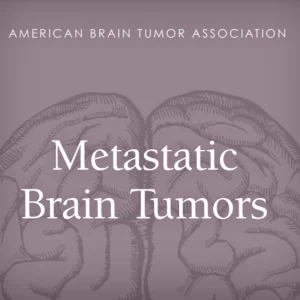
Living with Brain Metastases from Lung Cancer
Did you know 25% of lung cancer patients develop brain metastases? Get a look at the facts ahead of Lung Cancer Awareness Month.
Want to join the ABTA virtual 50 mile Facebook Challenge? Check it out here.

Sign up for our bi-monthly email to get the latest news on treatments, support, and stories from the brain tumor community.

Did you know 25% of lung cancer patients develop brain metastases? Get a look at the facts ahead of Lung Cancer Awareness Month.

New and updated resources from the ABTA can help you navigate brain tumor treatment and care decisions and receive personalized support.

ABTA Chief Mission Officer Nicole Willmarth, PhD, was recognized for her efforts to advance brain tumor research at the 26th Society for Neuro-Oncology (SNO) Annual Meeting.

A first-of-its-kind, cross-sectional survey of patients, caregivers and physicians on the diagnosis and treatment of brain metastases, conducted by the American Brain Tumor Association (ABTA), as part of its Metastatic Brain Tumor Initiative, revealed disparities in practice patterns and communication around metastatic brain tumors. These data highlight the need to increase accessibility to clinical trials, establish clear standards of care and improve physician-patient communication reflective of the unique needs of patients with brain metastases (BM). The survey results have been published open access in the journal Neuro-Oncology Practice.
The need for better brain tumor treatments and more help for patients is greater than ever. Brain tumors are still very hard to treat because of something called the blood-brain barrier, which makes it tough for medicine to reach the tumor. Brain tumor patients need more options.
That’s why we’re meeting hope head on—because donations lead to research, research leads to better treatments, and better treatments bring us closer to a cure.



